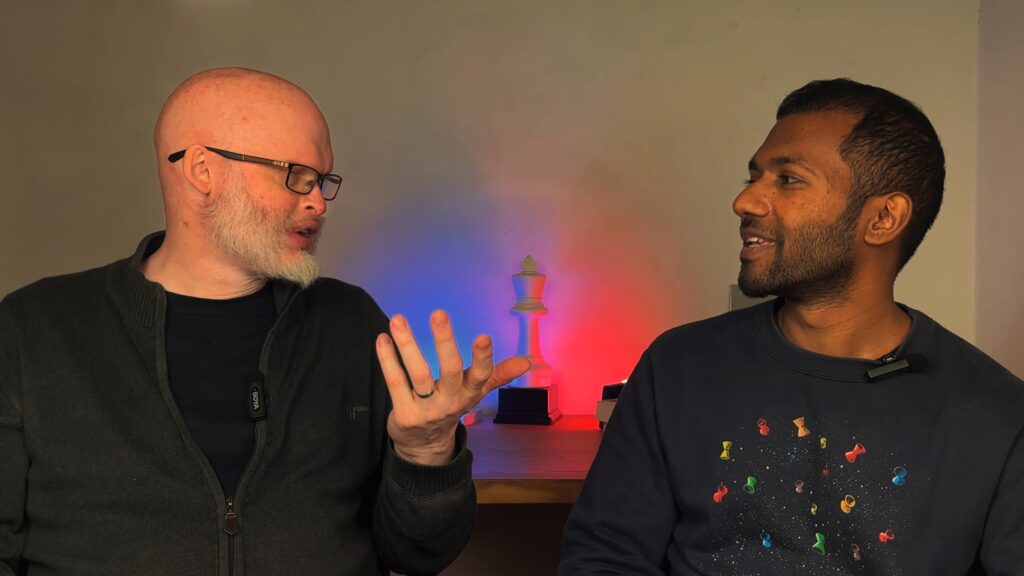
He has been one of my two language superheroes since a long time, even when I was still a teenager, living in Sri Lanka and learning French. It was amazing to see how someone, a human being, could simply learn and speak so many languages, as I was watching him swiftly change from a language to another in his Youtube videos. He is Richard, Richard Simcott, who was very kind enough to accept an invitation to do an interview for my recently launched Youtube channel dedicated to language learning – A Ceylonese Polyglot.
The interview which you can watch above is a one filled with curiosity, mistakes, discovery, and connection. From the very beginning, Richard made it clear that his love for languages started young. « I’ve been studying languages since I was about five years old, I was just interested in how people could speak differently. » he said, when he introduced himself.
The Plateau That Isn’t
For anyone who’s studied a language, the B1 or B2 level (as per the CEFRL, the European Language Standard) is often where motivation begins to slowly plummet. Richard shared that he doesn’t really see this stage as a plateau. Instead, he reframes it: “What you’re doing is learning to communicate effectively on a new topic… until you’ve covered most things that you use.” This shift in mindset — from seeing it as a stall in progress to a widening of vocabulary and contexts — is powerful. It reminds learners that fluency isn’t about mastering everything; it’s about gradually expanding your comfort zone.
He also emphasized that you don’t need to learn every word or topic. “There’s no point in learning all of the countries of the world or every job title,” he explained. Learn what’s relevant to you, and the rest will come naturally as you encounter it.
Effective Methods and What Really Works
So what actually works when it comes to learning a language? Richard swears by constant exposure: listening, reading, speaking, and writing. But it has to be meaningful. “There’s no point learning lots and lots of stuff that’s not relevant to your life.”
Importantly, he discourages relying solely on vocabulary lists. Instead, he recommends immersion through content you enjoy—whether it’s podcasts about yoga or science fiction novels. You don’t just memorize words, you live with them.
He also acknowledges that the method depends on the language. Learning a language with a different script, like Hindi or Georgian, requires special attention to how sounds are represented. For this, “script hacking” books or writing system practice websites can be useful. Please make sure to check the original video if you need exact references of these sources that Richard mentioned.
The Role of Environment
Richard emphasized the importance of preparing before immersing yourself in a country. “At least learn the basics before you go,” he advised. This way, when you land, you can build on something instead of starting from zero. Having even a basic ability to greet people or order food not only saves time but shows respect—and often opens doors to deeper conversations.
As someone who has lived in different countries, Richard has had firsthand experience with how culture affects language learning. Something as simple as opening a window in Italy and in the UK can have totally different interpretations, so it depends on where exactly you are. It’s these small cultural insights that make learning a language much more than just memorizing words.
Maintenance and Letting Go
Maintaining languages is another challenge, especially when you’ve studied so many. Imagine 50+ languages… Richard has a realistic and healthy approach to this. He accepts that not every language will stay at the same level, and that’s okay. “You only have a certain number of hours in a day,” he said.
The AI Question
Given the rapid rise of language learning apps and AI tools, I asked Richard about his thoughts on using technology. He uses ChatGPT, for example, to practice speaking, ask grammar questions, and even simulate conversations. “Is it the main thing I use? No, It’s a tool, I use” he replied.
But he cautioned about relying too heavily on AI without verification. In one amusing anecdote, he shared how ChatGPT gave him the wrong Maltese word for “marigold,” leading him down a long, incorrect etymological rabbit hole. Only after checking with a human teacher did he realize the mix-up.
On Motivation and Community
Languages, in Richard’s experience, often choose you rather than the other way around. He started learning Cornish during the pandemic, simply because a friend invited him to join a class. What began as curiosity turned into passion, leading him to complete four levels of Cornish proficiency and join the terminology panel. “I didn’t know it would become such an important part of what I do and who I am” he added.
This kind of serendipitous discovery is what makes language learning so human. It’s about more than speaking—it’s about stories, connections, and being part of something bigger.
The Polyglot Conference
One of Richard’s most influential contributions to the language community is founding the Polyglot Conference in 2013. What started as a meet-up for language enthusiasts is now a global event bringing together learners, teachers, academics, and curious minds from all backgrounds. “Whether you’re learning your first or 31st language, there’s always something to learn from someone else.” he mentioned.
Final Words of Wisdom
For those just starting their language journey, Richard’s advice is simple and kind: “Be patient. Be kind to yourself. Make mistakes. Forget things. And just come back to it regularly. Do something every day.”
Language learning is not about perfection. It’s about persistence, curiosity, and finding joy in the process. Whether you’re learning to connect with a culture, revive a heritage, or just for fun, the path is yours to walk. And as Richard Simcott shows, it’s a path well worth taking.